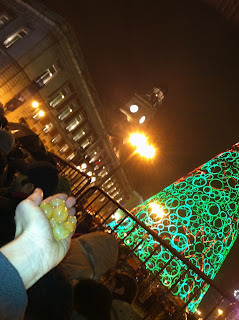November 28, 2007 - Jeddah, Saudi Arabia


"Everytime I read the news
I'm always more confused
Tellin' me to choose
But there's only lies to choose from..."
~ Michael Franti, Spearhead
Jeddah temperature high: 95 degrees F
Hood River temperature high: 41 degrees F
The big pink elephant is still standing in the middle of the room. Although our Saudi Arabia experience has proven spectacular, the big elephant that must be addressed is violence.
Everywhere we go a police car escort is in front, and sometimes in back, of our van. In addition, all hotels are protected by a large truck with an automatic machine gun strapped to the top. Many Americans have been killed in Saudi Arabia since and before 9/11. The feeling of needed protection is increased when every time we approach a sketchy scenario Eric turns to me and whispers, “This looks like a good place for an ambush.”
For hundreds of years there has been conflict in the land where Asia, Europe, and Africa meet. Conflict has additionally increased since 1947 when Palestine was taken from Muslims after 2,000 years and given to Jewish settlers. Saudi Arabia does not recognize Israel as a country; instead “occupied territory” hallmarks world maps located in schools visited.
Compromise is defined as a “settlement of differences by reaching an agreement to end conflict”. For decades there have been attempts to bring together representatives from Middle East countries to discuss a compromise over disputed land and end violence.
Yesterday in Annapolis, Maryland, the U.S. hosted a Peace Conference between Palestine and Israel. And for the first time, the Arab League (including Saudi Arabia representatives) attended and were involved in the process.
In addition to violence, the second large pink elephant in the room is censorship. Censorship is alive and well in all countries including the United States, however, not as extreme as in Saudi Arabia.
Today we visited the Saudi Gazette. It was interesting to consider the differences and similarities between Saudi Arabia and the United States new gathering strategies. Saudi Arabia does not have a 1st Amendment to protect “freedom of speech,” thus reports work under the assumption of cultural sensitivity. In addition, women reporters rarely interview men because it is uncomfortable. Essentially, newspapers choose stories based on what is best for their community. Opposing, media in the United States often chooses stories based on cultural negatives and what will sell.
News channels available in all our hotels include CNN, the BBC, and Al Jazeera. CNN portrayed the Peace Conference in positive light, the BBC was neutral, and Al Jazeera recognized international manipulation of the talks.
Before leaving for Saudi Arabia, all educators received a book of Travel Tips. The following were listed as “What Not to Bring”:
According to Saudi law, you may not bring the following items into Saudi Arabia
• Bibles
• Religious jewelry
• Religious icons
• Alcohol
All of the aforementioned items can be confiscated upon arrival in Saudi Arabia, and may be grounds for denying entry into the country.

